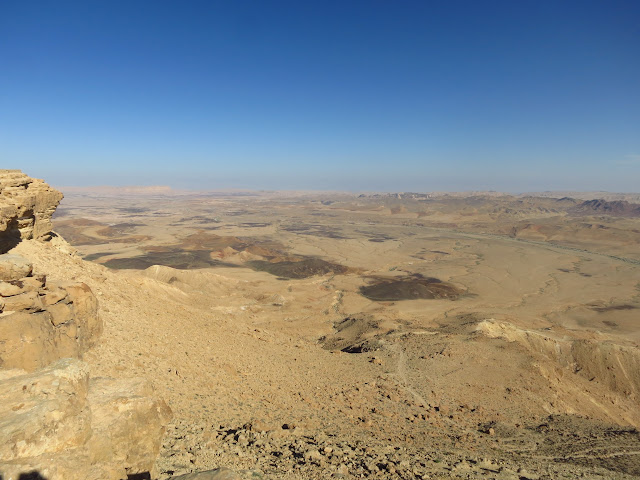The highlights of today's travel were geological really. We left Ein Gedi and journeyed to the Bedouin city of Rahat where we visited a Bedouin organization called A New Dawn in the Negev.
 |
| Rahat - with 'unrecognised' housing |
 |
| Jamal, our host and founder of A New Dawn |
The Bedouin became Israeli citizens after 1948, but had to move into certain areas to receive all the benefits of citizenship. Being nomadic, many refused to move. The Israeli government doesn't recognise their villages, making access to educational, health and other social services difficult. A New Dawn in the Negev deals with some of the problems this brings. You can have a look at their website: http://www.anewdawninthenegev.org/
We lunched at a Bedouin place: The meal was simple - vegetarian upside down dish (I can't remember the name in Arabic, but that's what it means) It was rice with vegetables and some spices. We ate it with loads of salads, hummus and large flat breads.
 |
| Bits of old ruins just lying around |
 |
| The 'restaurant' |
 |
| Dinner |
 |
| Our host with Dianne |
After lunch we headed for Makhtesh Ramon, a large rift valley like geological feature in the Negev Desert. This is amazing, the result of ancient ocean action dissolving a hard limestone crust and allowing erosion of the sandstones beneath during millennia. A makhtesh is a mortar and the pestle is the sea, wind and occasional rains.
 |
| Makhtesh Ramon |
The kibbutz has 150-odd members who live in an almost religious life like way. They share everything, put all income in common, draw funds from one account and make all decisions in common. There are 400 people who live in the kibbutz - these extras are children of kibbutzim and paying residents. The children and others who wish to join the kibbutz must spend time living there before being accepted. Then they must make a commitment to the kibbutz which is for life. Like religious life, they can leave if they wish, but must do so with very little. There are interminable committees for regulating the life of the kibbutz. This kibbutz is fairly secular. They do celebrate Jewish feasts publicly, but each family or individual is free to observe or not the religious rules in their own home. Apparently there are members who are not Jews.


















No comments:
Post a Comment